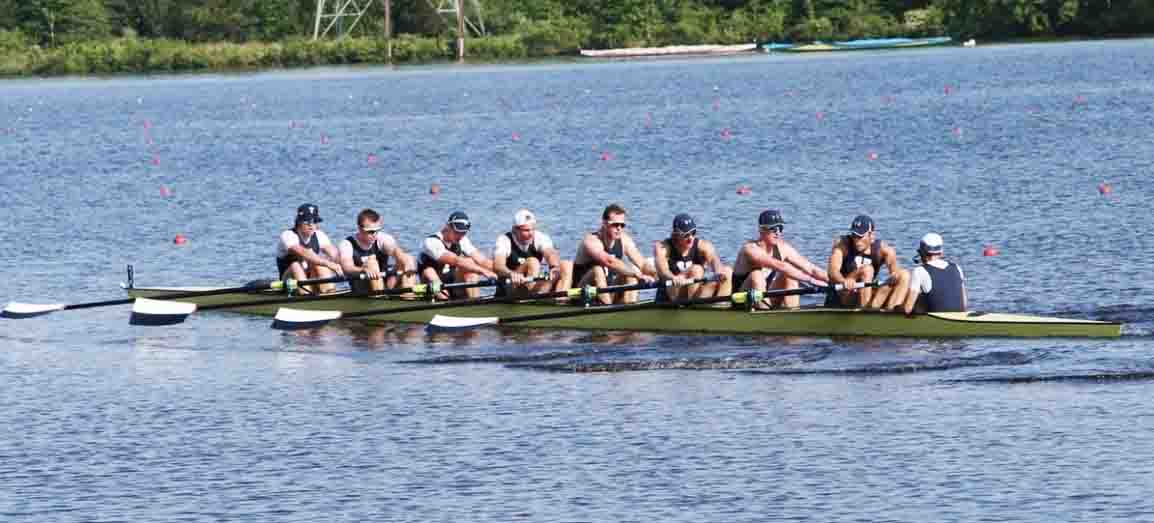
Two-time defending national champion Yale heavyweight crew is a collegiate powerhouse ranked first in the nation — and its alumni are on the path to international acclaim. Six former members of the team are training full-time to represent five nations in the 2019 World Championships and the 2020 Tokyo Olympics.
Former rowers Tom Dethlefs ’12, Simon Keenan ’15, Stephan Riemekasten ’17, Ollie Wynne-Griffith ’17, Sholto Carnegie ’18 and Paul Jacquot ’18 are competing to represent five different national teams at the 2019 World Championship in Ottensheim, Austria, at the end of August; the top eight boats at the World Championship will then qualify for a spot at the 2020 Tokyo Olympics.
“I believe the environment at Yale, in all its dimensions, and the training they receive at Yale prepares them for their national teams,” head coach Steve Gladstone said. “Even then, it takes a lot to be the best at what you do — quite literally at an Olympic level. But they all have that drive, that passion to be the best at what they do. That’s why they’re out there competing for a chance to compete for an Olympic medal.”
Dethlefs, Wynn-Griffith and Keenan previously raced in the American, British and Australian eight-man boats, respectively, at each of the last two World Championships, and Jacquot suited up for the Swiss in the four-man boat last summer. Riemekasten and Carnegie have been added to the mix for the 2019 race for the German and British units. For all six former Bulldogs, there are no guaranteed spots on any of the national team rosters.
Each heavyweight rower will have to duke it out with the best in their nation to represent their respective countries at the World Championships; all six train almost daily and receive monetary compensation based on their performances during this period, so only the most passionate of rowers take up the grueling challenge without a guaranteed national spot.
Dethlefs and Jacquot both starred as former team captains at Yale; Wynn-Griffith and Riemekasten won national championships as seniors in 2017, while Jacquot and Carnegie successfully nabbed yet another title at the IRA National Championship Regatta a season later. Despite all the collegiate success and hardware, however, there is no substitute for an Olympic medal.
“The way rowing works is that you qualify a boat for the Olympics at the world championships the year before,” Jacquot said. “In August 2019, at the World Championships, my boat will have to make the top eight to obtain a qualifying spot for the 2020 Olympics. I’m currently training with the Swiss to actually reach one of these eight qualifying spots. There is no certainty I will be going yet. Moreover, at the World Championships, you qualify the shell not the crew. That means it could be different guys who race at the 2019 World Championships and the 2020 Olympics.”
Training for the challenge begins long before a rower sets foot on Yale’s campus, but there is no doubt that what happens during those bright college years massively impacts the abilities of Eli alumni. Yale is home to the $7.5 million Gilder Boathouse, a massive 22,000-square foot rowing complex on the Housatonic River, as well as three moving-water rowing tanks and dozens of ergometers in the bowels of Payne Whitney Gymnasium.
Most evident, of course, is the training rowers receive from their coaches at Yale. Gladstone is a legend in the national and international rowing community; he has coached his squads to 13 IRA National Championships, which ranks as the second-most of all time behind Cornell’s Charles E. Courtney, who last coached in 1920. Gladstone himself has also served on the Men’s Olympic Rowing Committee.
Elite coaching doesn’t just come from the top, however. Assistant coach Mike Gennaro is a former Syracuse heavyweight captain and served as an alternate for the American 2012 London Olympics squad while other assistant coach Phillip Brunner rowed at Notre Dame and served as head coach of the team for two years.
“I lived this life after I graduated from college and it’s an interesting situation to be in,” Gennaro said. “A lot of the funding you receive is performance-based, so if you’re a new guy with no results to show, it’s hard to earn funding and a lot of your expenses have to come out of your own pocket. It’s stressful, waking up every day telling yourself that you’re ‘training for the Olympics’ and your goal is to win an Olympic gold medal but there is no guarantee that you’ll even make the Olympic team a few years down the line.”
The current members of the Yale heavyweight crew team will defend, fittingly, the Olympic Axe against No. 10 Dartmouth this Saturday on the home waters of the Housatonic.
Bentley Long | bentley.long@yale.edu







